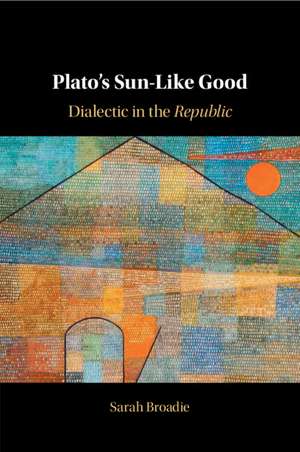Plato's Sun-Like Good: Dialectic in the Republic
Autor Sarah Broadieen Limba Engleză Paperback – 15 feb 2023
| Toate formatele și edițiile | Preț | Express |
|---|---|---|
| Paperback (1) | 221.34 lei 6-8 săpt. | |
| Cambridge University Press – 15 feb 2023 | 221.34 lei 6-8 săpt. | |
| Hardback (1) | 582.00 lei 6-8 săpt. | |
| Cambridge University Press – 21 iul 2021 | 582.00 lei 6-8 săpt. |
Preț: 221.34 lei
Nou
Puncte Express: 332
Preț estimativ în valută:
42.35€ • 44.34$ • 35.04£
42.35€ • 44.34$ • 35.04£
Carte tipărită la comandă
Livrare economică 05-19 aprilie
Preluare comenzi: 021 569.72.76
Specificații
ISBN-13: 9781009016407
ISBN-10: 1009016407
Pagini: 250
Dimensiuni: 152 x 229 x 13 mm
Greutate: 0.34 kg
Editura: Cambridge University Press
Colecția Cambridge University Press
Locul publicării:Cambridge, United Kingdom
ISBN-10: 1009016407
Pagini: 250
Dimensiuni: 152 x 229 x 13 mm
Greutate: 0.34 kg
Editura: Cambridge University Press
Colecția Cambridge University Press
Locul publicării:Cambridge, United Kingdom
Cuprins
Part 1. Approaching the Sun-Good Analogy: 1.1 Introductory; 1.2 The philosopher-rulers' intellectual task; 1.3 'The most important thing to learn': Between plural and singular; 1.4 What further knowledge does the longer way achieve?; Part 2. The Form of the Good and Knowledge: 2.1 Sun, cave, and sun again; 2.2 Connecting sun and line; 2.3 Higher and lower intellectual levels; 2.4 Mathematical versus dialectical hypotheses; 2.5 Saphēneia; 2.6 The form of the good as non-hypothetical principle; 2.7 Dialectic and the good: Some questions; 2.8 The role of the form of the good in dialectic; 2.9 Some objections and replies; 2.10 Textual counterevidence; 2.11 The non-hypothetical principle as first premiss?; 2.12 The form of the good as object of definition?; 2.13 Dialectic and experience; 2.14 Diagrams, dialectic, and context; 2.15 Dialectic in government; 2.16 Not rigorous enough?; 2.17 Why is dialectic cognitively superior to mathematics?; 2.18 Why are we shown so little about dialectic in the Republic?; 2.19 True philosophers versus sight-lovers; 2.20 Criteria and scope of 'good'; 2.21 Main positions of Parts 1 and 2; Part 3. The Form of the Good and Being: 3.1 Preliminaries; 3.2 First proposal; 3.3 Interim discussion of 505a2-4; 3.4 Second proposal; 3.5 Perfectionist accounts; 3.6 System accounts; Part 4. Various Further Questions: 4.1 Ambiguity of 'the good' (I); 4.2 Ambiguity of 'the good' (II); 4.3 Why the mathematical education?; 4.4 Cosmology, theology; Part 5. Winding Up.
Recenzii
'Sarah Broadie's new book is one of the most exciting and important books I have read on Plato's Republic. Its rigorous and systematic challenge to orthodox ways of understanding what the form of good is, and why mathematics plays a central role in a philosopher's education, will be debated for many years to come.' Richard Kraut, Northwestern University
'… exemplary and inspiring.' William Altman, Bryn Mawr Classical Review
'… exemplary and inspiring.' William Altman, Bryn Mawr Classical Review
Notă biografică
Descriere
An original and lucid discussion of the Republic's philosopher-rulers, their dialectic, and their relationship to the form of the good.
